Summer Study: What Do Phase I Scholars Do?
DO‑IT Phase I Scholars participate in a two-week, live-in Summer Study session on the UW Seattle campus. They learn about college life; explore the Internet; interact with peers, staff, and mentors; and have fun. The DO‑IT Scholars program started in 1993 as an experimental project for teens with disabilities nationwide. It is currently open to Washington State teens and is supported by the State of Washington, the Boeing Company, the Microsoft Corporation, and the National Oceanic and Atmospheric Administration.
Microsoft Accessibility
At Microsoft we went to the Xbox accessibility room where we saw the innovative technology they were creating to expand Xbox’s player base. They showed us how 3D audio effects could be presented in a headset, as well as a vest, created for disc jockeys (DJs), but used by people with hearing impairments so they can feel the effects in a game that others would be able to hear. We also got to explore controllers that were smaller in size and lighter than normal for people who aren’t able to use the standard controllers.
We also saw new features added to the Xbox One to help people with visual impairments, such as audio description, magnification, and high contrast. Examples helped us understand these feature’s in action--one example was from a professional blind Killer Instinct player named Sightless Kombat who uses the sound options of the game to play competitively online.
Accessible Sports
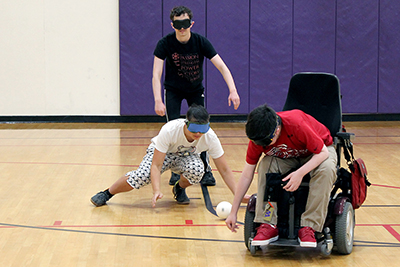
On Sunday we went to the Intermural Activities Building, a fitness center on the University of Washington campus. There we played a variety of accessible sports. The first sport we played was goalball, which is a sport for people with visual impairments. We put on blindfolds and were tasked with defending a goal from a heavy, jingling ball, by throwing ourselves out to block it. It was terrifying at first, but once we got the hang of it we started to have a lot of fun.
The second sport we played was beep baseball. Since the gym didn’t have all the equipment, people just rolled beeping balls at us while we were wearing the blindfolds. This activity was a lot like goalball, but the balls were a lot smaller and therefore much harder to grab as they were rolling towards us. We honestly couldn’t catch any of them without laying flat on the ground. Even though this sport was harder than goalball, it was still a fun and interesting experience.
In wheelchair basketball, the instructors showed us how to play basketball while using wheelchairs. We practiced dribbling the basketball, traveling with the ball, playing defense, and making baskets. At the end we played a scrimmage, with five people per team. It was interesting to learn a different way to play basketball.
We also played seated volleyball. At first we learned two different ways that you can hit the ball. Then we played a scrimmage game for the rest of the time. We learned that you have to slide around the court but cannot stand up, which was especially challenging.
University Village
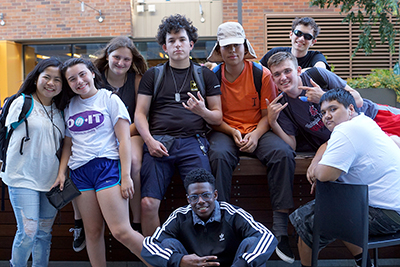
The trip to University Village (U Village) was a highlight of Summer Study. Not only did this experience give us an opportunity to get to know each other, but it also allowed us to talk about serious matters, such as our disabilities and our backgrounds.
U Village is an outdoor mall complex that is less than a mile from the University of Washington. From campus, there is a long steep hill, making it difficult for people with physical disabilities to get there. Fortunately, the DO-IT center provided transportation in vans for those who needed it. This is typical for DO-IT as they always strive to make it possible for disabled people to travel freely and participate in society.
When we got to U Village, we were split into groups. Our group went to the Microsoft Store, the Apple Store, the Seattle Team Store, the Nike Store, and Starbucks. During the visit to various stores we talked about many topics, including ourselves. Overall, the trip was a perfect gateway to create a community between the Scholars, enhancing our experience at the DO-IT Scholars program.
The Eventful First Night
It was a very peaceful first night at DO‑IT, until 2:00 a.m. I was sound asleep, as were most of the other Scholars. All of a sudden, I heard a blaring noise. Someone had set off the fire alarm. People were running around outside our dorm, trying to get organized. There were a lot of people knocking on doors, trying to get everyone out of the building. I couldn’t get out of bed because I use a chair to get around, so I had to lay there and endure the noise. This fire alarm made the most annoying sound I had ever heard. There was a regular alarm, then there was a worse higher‑pitched noise. My deaf roommate did not hear the alarm, so he was woken up by a bright light shining onto his face and a shaking bed. A few minutes after the alarm went off, a person came to the door and made sure everything was okay.
All in all, it was a very eventful first night at DO-IT, but it’s always good to keep people on their toes and be prepared for everything.
Pacific Science Center
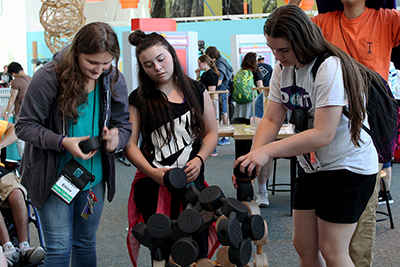
The first thing that we did after we entered the Pacific Science Center was visit the Boeing IMAX Theater. There was no problem entering the theater and there was plenty of accessible seating. We watched the movie Dream Big, which was based around engineering and showed us how all things come from simple ideas, and that any one of us could be the one who has the next big idea.
After watching the movie we had lunch outside and then were able to explore the rest of the museum. It is packed full of awesome exhibits on everything from space to dinosaurs.
The last thing we did at the Pacific Science Center was watch a Michael Jackson laser show. No one had any trouble accessing the laser dome or enjoying the show. It was awesome watching the show and listening to the music either reclined in a chair or lying on the floor. The show was a lot of fun and very relaxing. Visiting the Science Center was one of my favorite events during Summer Study.
Visiting Microsoft
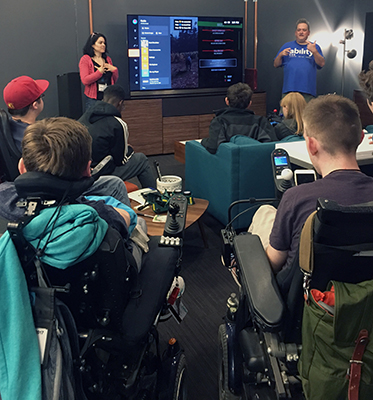
During the third full day of summer study, the Scholars took a trip to the Microsoft Headquarters in Redmond, WA. We began the day by brainstorming ideas about our ideal website design. Afterwards, four Microsoft employees with disabilities shared their experiences. Then things start to get really cool; we got to play with some adaptive technology for people with various disabilities.
The first piece of technology was named Seeing AI, an application for iOS devices. Seeing AI is a service that uses data from a photo and identifies the object(s) in that photo.
If a person is in the photo, the app attempts to identify their age, gender, and facial expression. However, the AI is relatively new and still learning—I used the application on myself and it identified me as a 30 year-old male so, they have some work to do.
The next piece of technology was a mobile arm attached to a sensor to allow someone to write with their sight. This is most useful for people who have ALS, are Quadriplegic, or have a disability that affects the use of their hands.
The last piece of technology introduced to us was the Hearing AI program. Hearing AI helps those who are deaf by describing sounds in the environment through graphic visualizations.
After looking at the adaptive technology, we moved to the experimental Xbox room. Here we saw a lot of upcoming modifications for controllers and accessibility features for people with sensory impairments.
One of the programs introduced was the Magnifier. This tool zooms in on anything that is currently on the screen, helping people with visual impairments. Another tool was called Narrator. Anything that is highlighted will be narrated so that blind people may hear what they are doing.
Overall the trip gave us a look at how Microsoft is making assistive technology for people to improve their quality of life. They are at the forefront of promoting a more inclusive world.
Phase II Projects
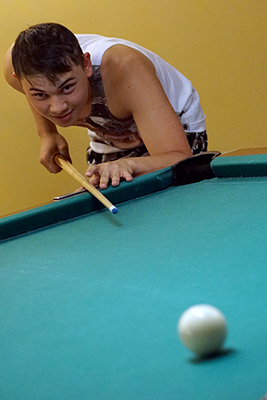
Every year the DO-IT Phase II Scholars present about themselves to the Phase I Scholars, other Phase II Scholars, Interns, and staff. During these presentations, you learn new things about the Phase II Scholars and the project they did throughout the school year. Phase II Scholars have a whole school year to work on their projects, and the presentations have to be less than five minutes long. These presentations also help you with your presentation skills.
This year, we learned many cool things about the Phase II Scholars. We learned from Adrian about Camp to Belong, a camp that reunites foster children with their siblings. We also learned about Takashi and his love for billiards. The projects and presentations can be about anything that interests each person.